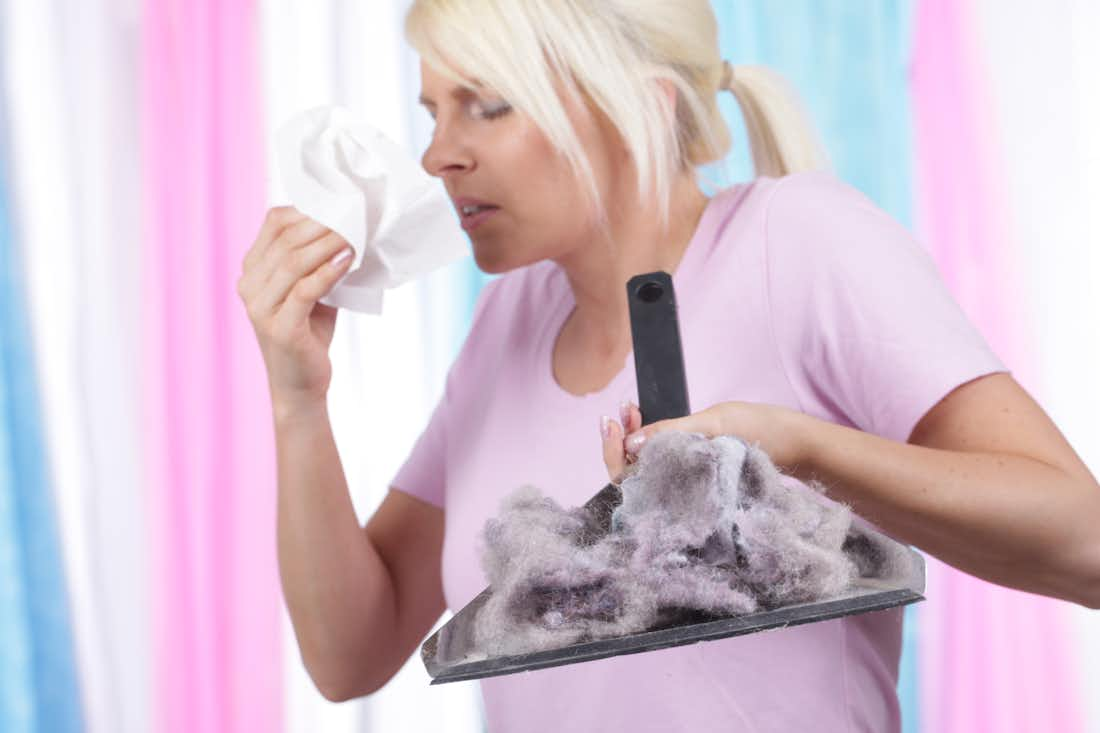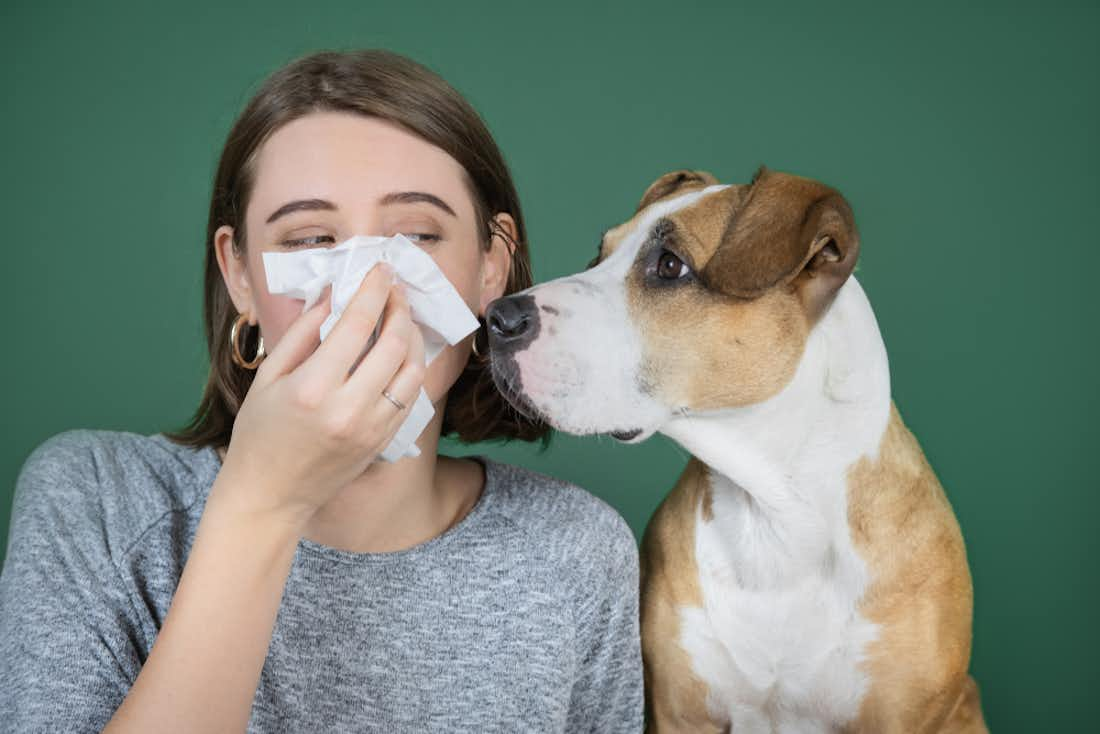Nov 4, 2021
What Is an Allergen?
5 minute read
If the sight of a tree or the thought of a dog makes you want to sneeze your eyes out, you either have an undiagnosed sneezing problem, or you have allergies. And our guess is it’s probably the latter.
Allergens like pollen, dust mites, pet dander, and ragweed are detrimental to sensitive immune systems. They’re the source of runny noses, stuffy noses, watery eyes, itchy eyes, and more.
But how can an invisible force have so much power over our complex bodies? What exactly is an allergen, and what makes some of us more susceptible to their wrath than others? We’ve got some answers to your eye-burning questions.
Allergies? Geez, Louise...
An allergen is a substance that is capable of causing an allergic reaction. In most cases, these are things like pet dander, grass pollen, bee pollen, or certain foods. But you can theoretically be allergic to anything that causes you to have a negative reaction.
Many allergens are microscopic, meaning you can’t see them with your naked eye. For instance, dust mites are common indoor allergens that measure around 420 microns wide. That’s 0.0165354 of an inch.
This small nature of most allergens is what makes them so frustrating: how can something that can’t be seen without a microscope cause so much frustration? Well, you can actually blame your own immune system.
Your immune system is a complex system in your body that’s primary purpose is to prevent you from becoming ill due to a foreign substance. In cases such as a cold, your immune system will fight off the virus that’s causing it to keep you safe and sound. That’s why colds make you feel weak, sneezy, and achy -- it’s your immune system going into overdrive to get rid of it.
But things like pollen or pet fur aren’t actually harmful. In fact, they’re as harmless as can be. However, some people have sensitive immune systems that falsely believe these triggers are going to cause damage.
When that happens, the immune system kicks in and starts making you cough, sneeze, and wheeze to try to get this foreign substance out of your body. While we appreciate that the immune system tries to protect us, sometimes we wish it’d just relax.
All the Allergens
Theoretically, you can be allergic to anything. But there are a few triggers that are a bit more common than others. Here are some of the most prominent causes of allergies in the US.
Tree, Grass, or Weed Pollen
If you’re one of those people who loves the winter months because you finally get some solace from the sneezing and sniffling, then you’ve probably got pollen allergies. Pollen is released in the spring during the blooming season, these tiny molecules can get into your airways and make your immune system go into overdrive.
Since pollen allergies are an airborne allergen, the symptoms typically include:
- Sneezing
- Congestion
- Coughing
- Itchy, watery eyes
- Trouble breathing
Dust Mites
When you look at dust, you probably rarely think that those weird little particles are living creatures. But believe it or not, dust mites are very real and very much alive.
Before you get too creeped out by these creepy creatures, remember that they’re super tiny, and you can’t even see them with the naked eye. However, that’s what makes them so irritating for the typical allergy sufferer.
Dust mite allergy symptoms are often caused by inflammation of the nasal passages, and they include:
- Sneezing
- Itchy eyes
- Itchy skin
- Cough
- Postnasal drip
Relief For Reactions
While allergies can turn a good day into a bad one before it even gets going, hope isn’t lost. There are many different remedies and treatments to help you avoid and defend against allergens causing you discomfort.
Antihistamines
When your immune system starts trying to rid you of an allergen, it releases a chemical called histamine. This is the primary force that causes you to feel the symptoms of allergies.
So what happens when you just prevent histamines from forming in the first place? Peace.
Antihistamines do just that. They’re a medication that works to inhibit the production of histamines, so you don’t feel symptoms to such a severe extent as you would without them.
You’ve probably used an antihistamine before -- they’re your Zyrtec, Claritin, and Allegra’s. The thing is, these brand-name medications are costly despite being the same as much more affordable generic versions.
Cleared has various oral, nasal sprays, and eye drop antihistamines at a fraction of the cost of brand names. It’s low cost, but still high satisfaction. You shouldn’t need to break the bank just to breathe clearly.
Avoidance
Pretty much the only way to completely avoid allergy symptoms is to avoid the allergens entirely. And while this is much easier said than done, there are some simple steps you can take to reduce your reactions.
For seasonal allergies, try to stay indoors on days where the pollen count is high. Additionally, you can try to avoid areas where trees and grass are plentiful, such as forests or fields.
Dust mite and pet dander allergies can be demolished by doing a nice, deep clean. Wash your linens frequently, and be sure to use dusters and microfiber cloths on hard surfaces to pick up dust and pet dander so that it never even has a chance of getting into your body.
It can also be helpful to find out exactly what you’re allergic to so you know what to avoid. Do this easily right from home with our indoor and outdoor allergy test that analyzes 40 common environmental allergens. So you don’t even need to venture into the scary, allergy-filled world to find out what’s causing you some trouble.
Immunotherapy
Last but not least, you can treat the source of the allergen rather than just the symptoms. No, this isn’t some sick joke.
Allergy immunotherapy works by gradually exposing you to your allergen so that your body can slowly adjust to it. Over time, you start to develop immunity so that your symptoms are less severe, even without the need for antihistamines.
Sublingual immunotherapy, lovingly referred to as SLIT, is the only FDA-approved way to treat allergies. All it takes is a tablet under your tongue, and you’ll be on your way towards an allergy-free life.
Don’t believe it works? A robust clinical study reported that those receiving allergy immunotherapy saw a 78 percent improvement in productivity at work, as well as a 90 percent improvement in general health status. The results are just as clear as your sinuses.
Clearing the Air
Allergens are any substance that causes an allergic reaction. And while anything can cause an allergic reaction in some people, some common triggers are pollen, pet dander, and dust mites.
Not everyone experiences symptoms when exposed to these things, but some have overactive immune systems that perceive harmless things like pollen to be harmful. That’s why it’s necessary to avoid and treat them before they inundate your entire life.
From antihistamines to allergy immunotherapy, Cleared has options for you to tackle the triggers finally. And with some of the lowest co-pays on the market, you’ll never need to revisit the drugstore.
Sources:



